On 16 September 2025, at APAG Headquarters in Ha Noi, Assoc. Prof. Dr. Nguyen Ba Chien, President of the Academy of Public Administration and Governance (APAG), hosted the delegation of leaders and managers from the Russian Federation and delivered a keynote on “Training high-quality human resources to meet the demand for comprehensive reform of Viet Nam’s public service.”
Attending the working session, on the Russian side, were Ms. Shafinskaia Natalia, Head of the Department of International Cooperation and Development, RANEPA; Ms. Lavrova Tatiana, Deputy Director of the Graduate School of Public Management, RANEPA; Mr. Averianov Evgenii, Director of the Federal Center for Training of Management Personnel – Graduate School of Public Management, RANEPA; Ms. Kozlova Iuliia, Deputy Director of the International Cooperation Center of the Graduate School of Public Management, RANEPA; Ms. Chuviurova Anna, Program Director of the Federal Center for Training of Managerial Personnel – Graduate School of Public Management, RANEPA, together with a delegation of 30 participants who are middle- and senior-level leaders and managers of agencies in the Russian Federation.
On the side of Ho Chi Minh National Academy of Politics (HCMA) were Dr. Lai Duc Vuong, Deputy Director General of the Department of Training; Assoc. Prof. Dr. Nguyen Van Hau, Deputy Chief of Office of HCMA.
On the side of APAG were Vice Presidents Dr. Bui Phuong Dinh, Dr. Nguyen Dang Que, Prof. Dr. Nguyen Quoc Suu, Dr. Hoang Ngoc Hai; leaders of APAG units; and APAG public officials and lecturers who had previously studied in the Russian Federation.
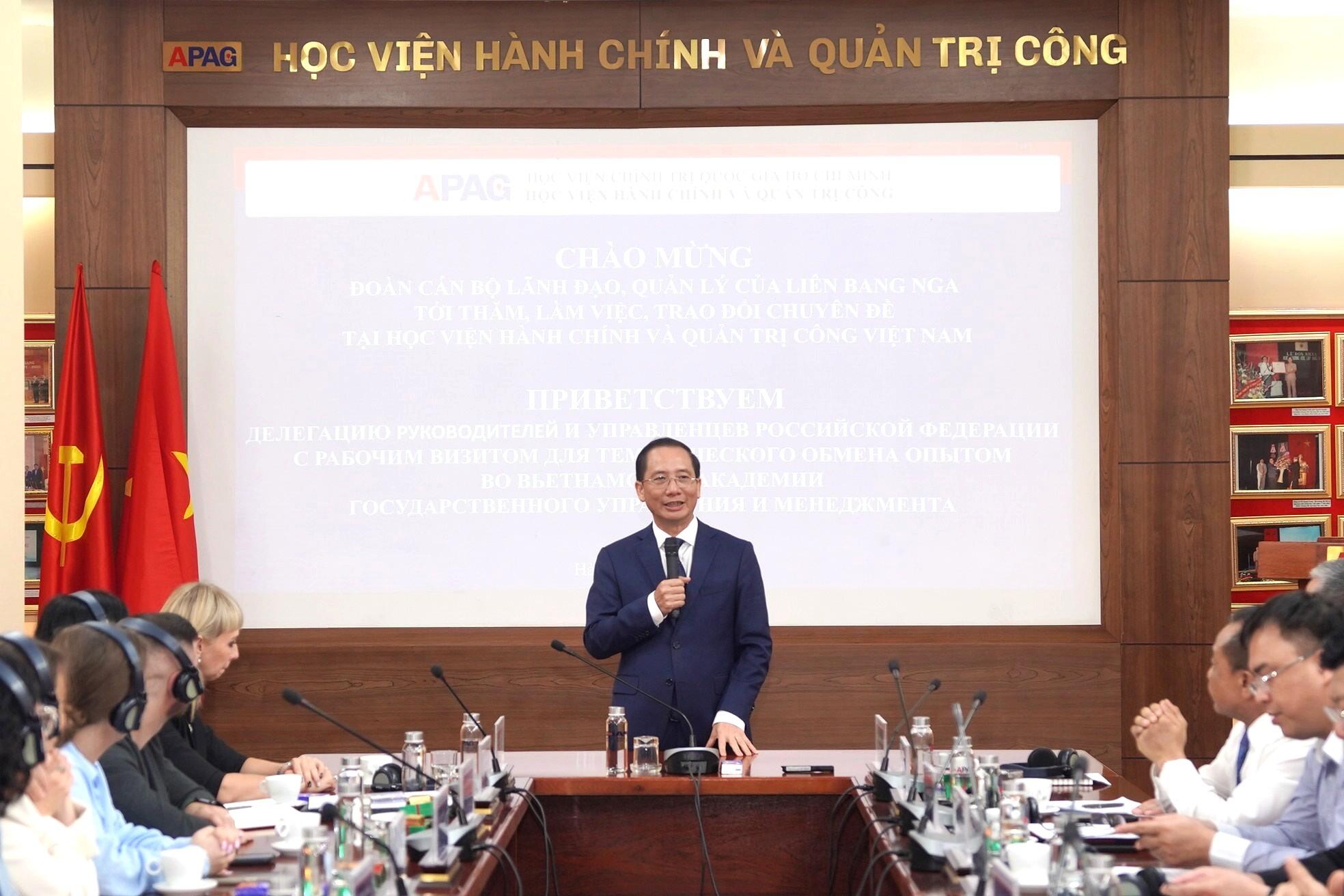 Assoc. Prof. Dr. Nguyen Ba Chien, President of APAG, delivers welcome remarks.
Assoc. Prof. Dr. Nguyen Ba Chien, President of APAG, delivers welcome remarks. Assoc. Prof. Dr. Nguyen Ba Chien expressed his delight in welcoming the delegation of leaders and managers from the Russian Federation. He emphasized that the delegation’s visit was not only a professional cooperation event but also a testament to the traditional friendship and close bonds nurtured over generations between Viet Nam and the Russian Federation. He also noted that many senior officials of APAG had received training in the former Soviet Union (now the Russian Federation) and are continuing to make significant contributions to the APAG’s training mission.
At the working session, Assoc. Prof. Dr. Nguyen Ba Chien delivered a keynote presentation on the theme: “Training high-quality human resources to meet the demand for comprehensive reform of Viet Nam’s public service.” The presentation focused on the following key points:
(1) Comprehensive reform of Viet Nam’s public service at present;
(2) New requirements public leaders and managers within the Vietnamese public service system;
(3) Reform in training high-quality human resources;
(4) Practical example: the leadership training program for key officials of Tay Ninh Province in 2024;
(5) New features of the program;
(6) Conclusion and lessons learned.
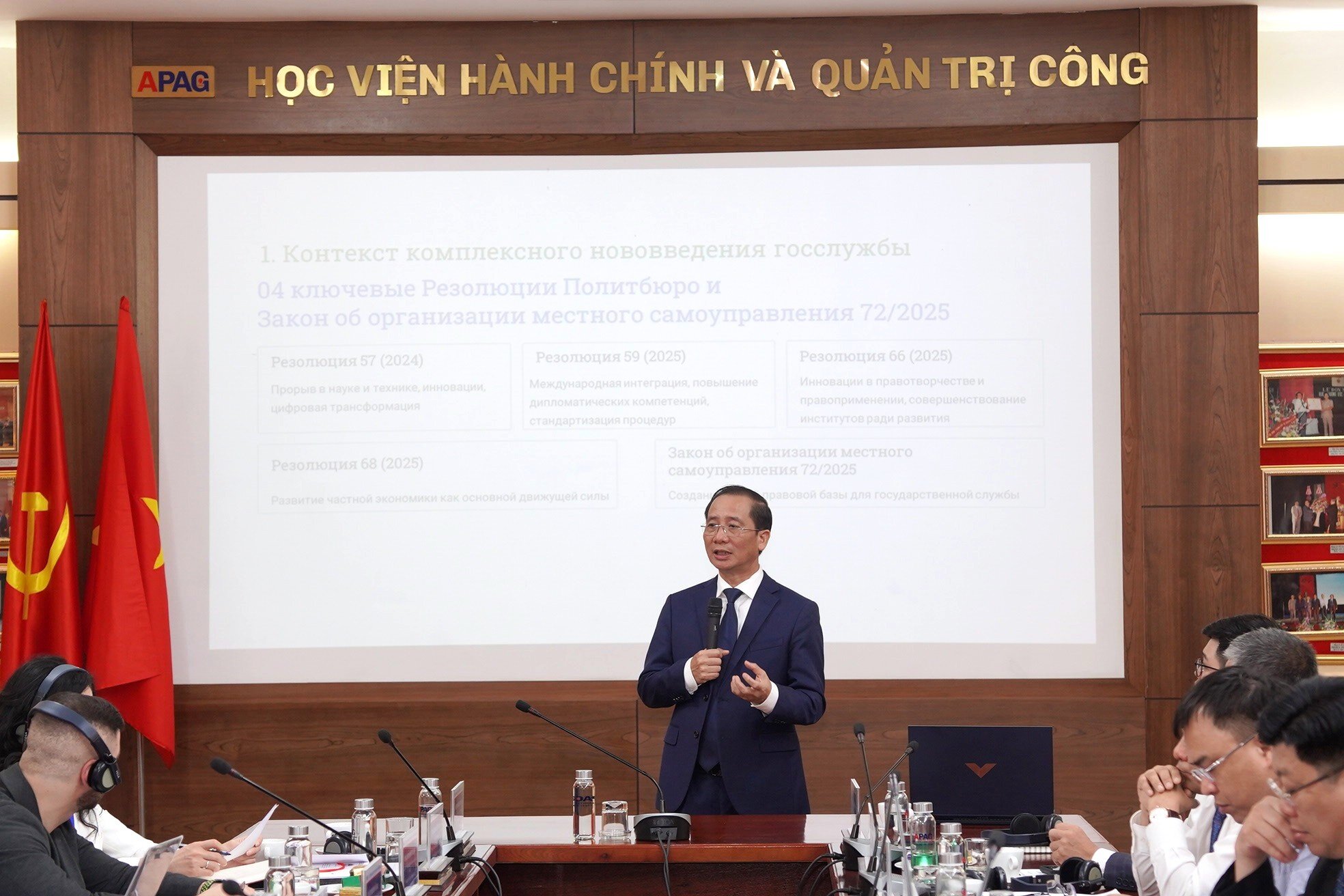 Assoc. Prof. Dr. Nguyen Ba Chien delivers a keynote presentation on “Training high-quality human resources to meet the demand for comprehensive reform of Viet Nam’s public service.”
Assoc. Prof. Dr. Nguyen Ba Chien delivers a keynote presentation on “Training high-quality human resources to meet the demand for comprehensive reform of Viet Nam’s public service.” According to Assoc. Prof. Dr. Nguyen Ba Chien, the driving forces for the comprehensive reform of Viet Nam’s public service today stem from three key factors: (1) the pressure to streamline the apparatus in order to improve governance effectiveness and efficiency; (2) the demand for building a service-oriented, transparent, and enabling public administration; and (3) the pressure of international integration, digital transformation, and sustainable development. He emphasized that comprehensive reform of the public service must be linked with restructuring the entire national governance system, from institutions, organizational apparatus, leadership and management methods, to the competencies of cadres and public officials.
In Viet Nam, during 2024–2025, the public service has undergone profound reform. At the central level, the number of ministries has been reduced from 22 to 17, with the dissolution of all 13 directorates, a reduction of 519 agencies, 219 departments, more than 3,300 sub-departments, and 203 public non-business units streamlined. At the local level, the local government structure has shifted from three tiers to two tiers, eliminating 696 districts, reducing the number of communes from 10,035 to 3,321, and merging 63 provinces and cities into 34.
This context of comprehensive reform imposes new competency requirements on cadres and public officials in general, particularly the contingent of public leaders and managers. Together with the promulgation of six key resolutions, leadership roles and methods are undergoing profound and fundamental changes, creating new demands for public officials; every management decision must be grounded in systems thinking, cross-sectoral and multi-level coordination, under the spirit of a “whole-of-government” approach.
In this context, public leaders and managers are compelled to shift their role from “purely administrative managers” to agents of innovation, coordinators, connectors, and drivers of development, while cultivating core competencies such as mindset transformation; multi-level, multi-actor coordination; human resource management within a streamlined apparatus; multifunctional and multi-tasked public servants; systems thinking – whole-of-government; transparency, accountability, and building public trust; inclusive governance; digital capacity; risk management; and sustainable development.
On the renewal of training for high-quality human resources, Assoc. Prof. Dr. Nguyen Ba Chien stressed that training must be conceived as an ecosystem for comprehensive capacity development. Training should combine classroom learning with practical experience as well as mentoring and coaching. This is a continuous cycle: Training - Fostering - Practicing - Experiencing - Validating. Accordingly, the pillars of capacity development should include: transformation of leadership mindset and vision; human resource management in a streamlined apparatus; systems thinking - whole-of-government; digital capacity; risk management and sustainability; multi-level, multi-actor coordination; multifunctional and multi-tasked competencies; transparency and accountability; international integration; and inclusive governance.
Sharing experience from the training program for Tay Ninh Province officials on “Enhancing effective local governance and leadership competencies” for the province’s key leaders, Assoc. Prof. Dr. Nguyen Ba Chien explained that the program was designed in close alignment with the province’s development strategy and practical context. The modules and case studies revolved around Tay Ninh’s seven strategic breakthroughs, addressing new public service requirements on a modern governance mindset, systems thinking, complex problem-solving, multi-level and multi-actor coordination under the “whole-of-government” approach, digital and green transformation, and inclusive governance, applied to the implementation of the province’s seven strategic breakthroughs. The training program was learner-centered. Participants were engaged throughout the entire training process (program design, lecture feedback, problem identification, analysis, and solution development). The focus shifted from “teaching” to “learning”; instructors acted as facilitators, providing methodologies, analytical frameworks, synthesis of principles, and systematization.
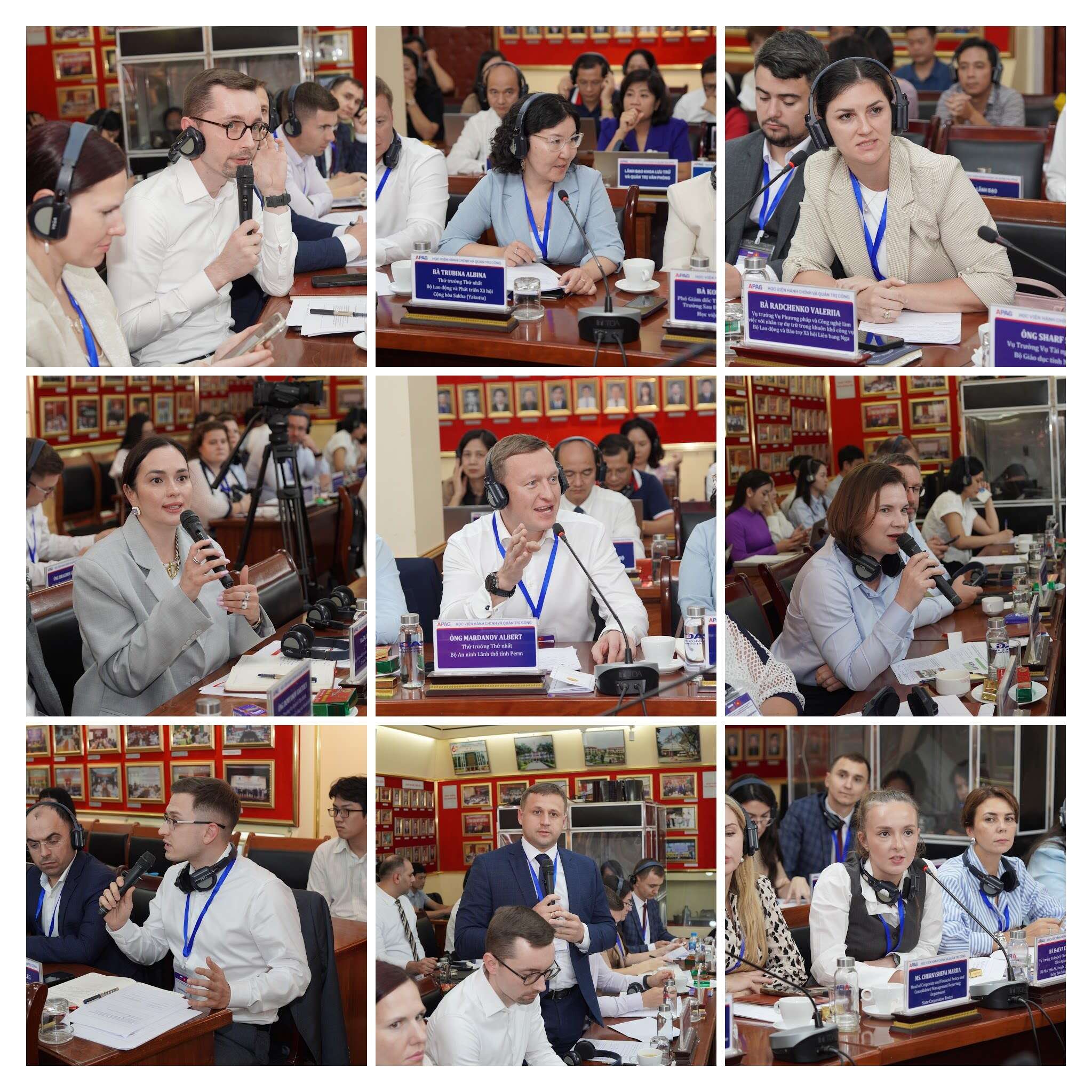 Meeting participants engage in exchanges and discussions.
Meeting participants engage in exchanges and discussions. On the topic of training high-quality human resources to meet the demand for comprehensive reform of Viet Nam’s public service, meeting participants have raised many questions, such as: How are cadres and public servants supported during the process of organizational streamlining? What policies does the State of Viet Nam have to protect the interests of those who retire under the streamlining scheme? If the policy is favorable and many public officials apply for retirement, how should this be addressed? When the apparatus is streamlined, pressure on public officials will increase, so how can work processes be optimized to ensure task completion? What policies exist to attract young talent to join the public sector?
In response, Assoc. Prof. Dr. Nguyen Ba Chien clarified:
(1) The State of Viet Nam provides good working conditions for public servants (facilities, workplaces, housing support, etc.), as well as training on new content to foster mindset transformation and vision development.
(2) Public officials who retire under the streamlining scheme (as stipulated in Government Decree No. 178) receive financial allowances (depending on their remaining years of service), pensions, and social insurance. If they remain healthy and capable, they may also sign employment contracts with organizations or companies.
(3) Applications for retirement are carefully reviewed by each agency/unit, particularly for positions still in demand or for capable officials deemed essential to retain - this is the purpose of streamlining combined with talent utilization.
(4) Increased pressure on officials during streamlining is unavoidable. However, work efficiency can be enhanced and individual burdens reduced by optimizing work processes, such as cutting administrative procedures; digitalization and application of technology (use of task management software, e-signatures, and e-documents); and capacity building for officials (training in new skills, empowerment, and greater autonomy).
(5) Regarding the attraction of young human resources into the public sector, Viet Nam has introduced various policies such as direct recruitment and special selection of outstanding graduates and talented young scientists; special salary schemes for talents; preferential policies for professional training; and opportunities for career advancement.
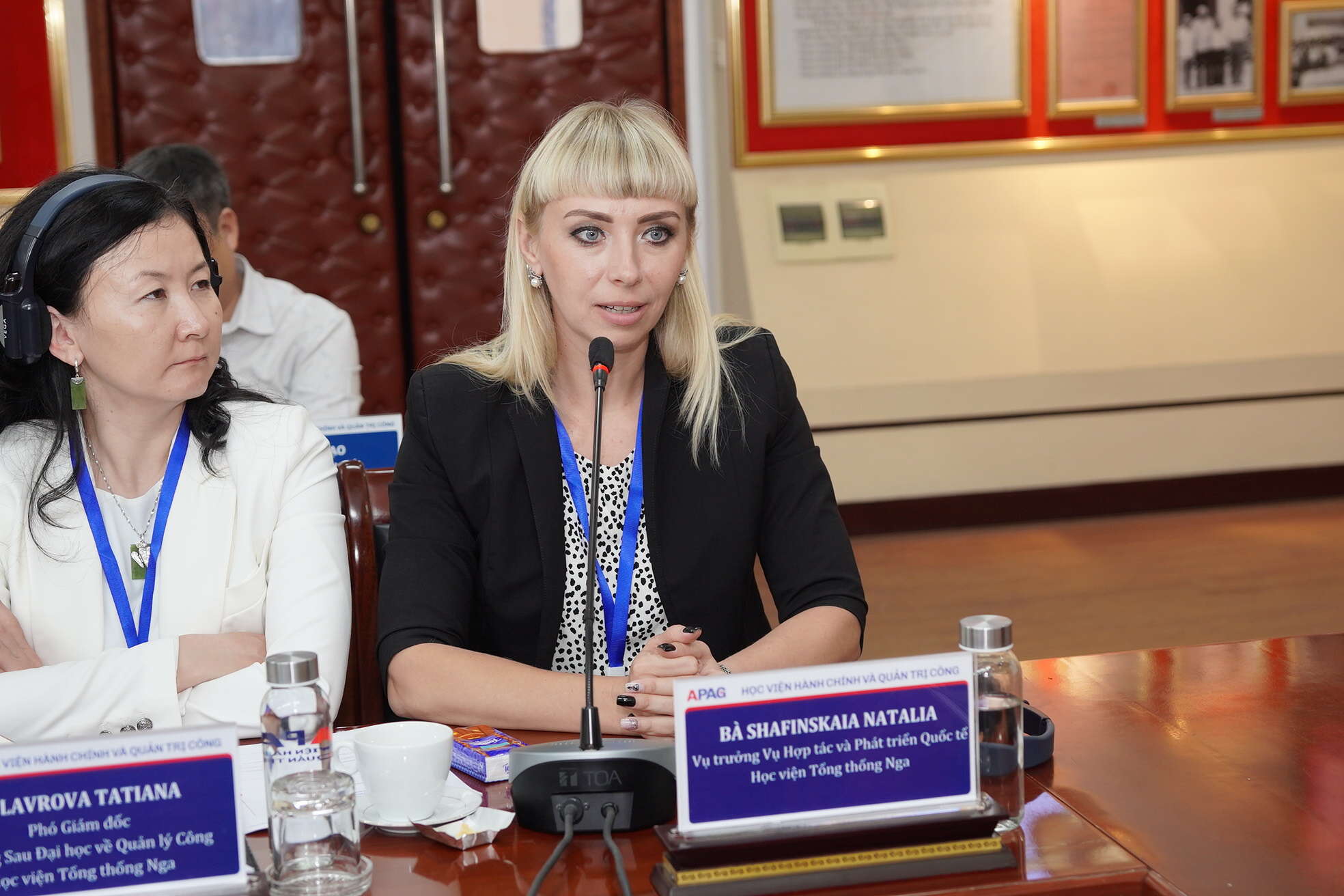 Ms. Shafinskaia Natalia, Head of the Department of International Cooperation and Development, RANEPA.
Ms. Shafinskaia Natalia, Head of the Department of International Cooperation and Development, RANEPA.At the conclusion of the meeting, Ms. Shafinskaia Natalia, Head of the Department of International Cooperation and Development, RANEPA, expressed her gratitude for the warm and respectful reception extended by the Board of Directors of APAG to the delegation. She particularly emphasized that the insights shared by Assoc. Prof. Dr. Nguyen Ba Chien had provided useful knowledge for the delegation’s leaders and managers, offering valuable lessons to be applied in management and policymaking practices.
Photos at the working session:
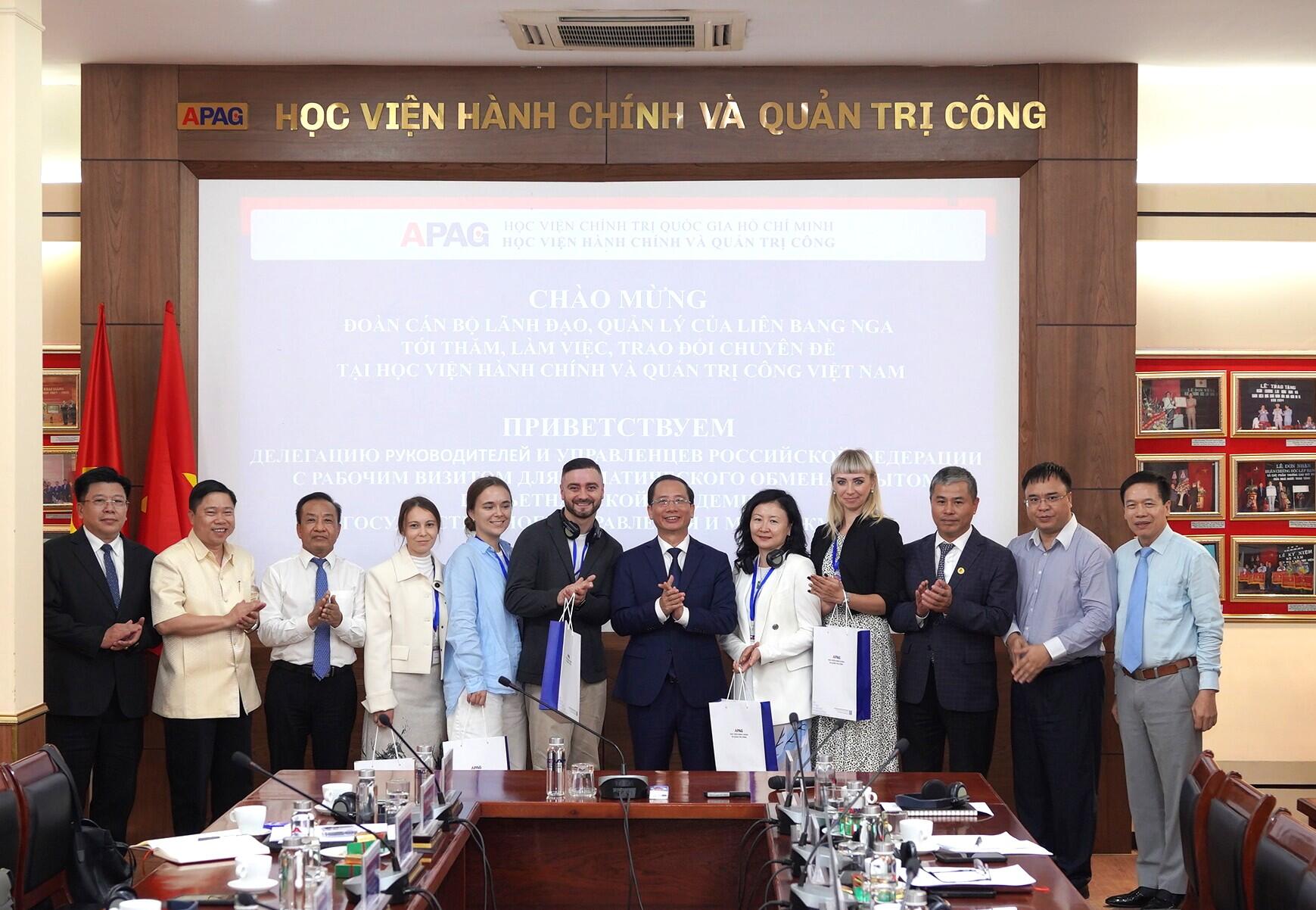 Assoc. Prof. Dr. Nguyen Ba Chien, President of APAG, presents souvenirs to the delegation of leaders and managers from the Russian Federation.
Assoc. Prof. Dr. Nguyen Ba Chien, President of APAG, presents souvenirs to the delegation of leaders and managers from the Russian Federation.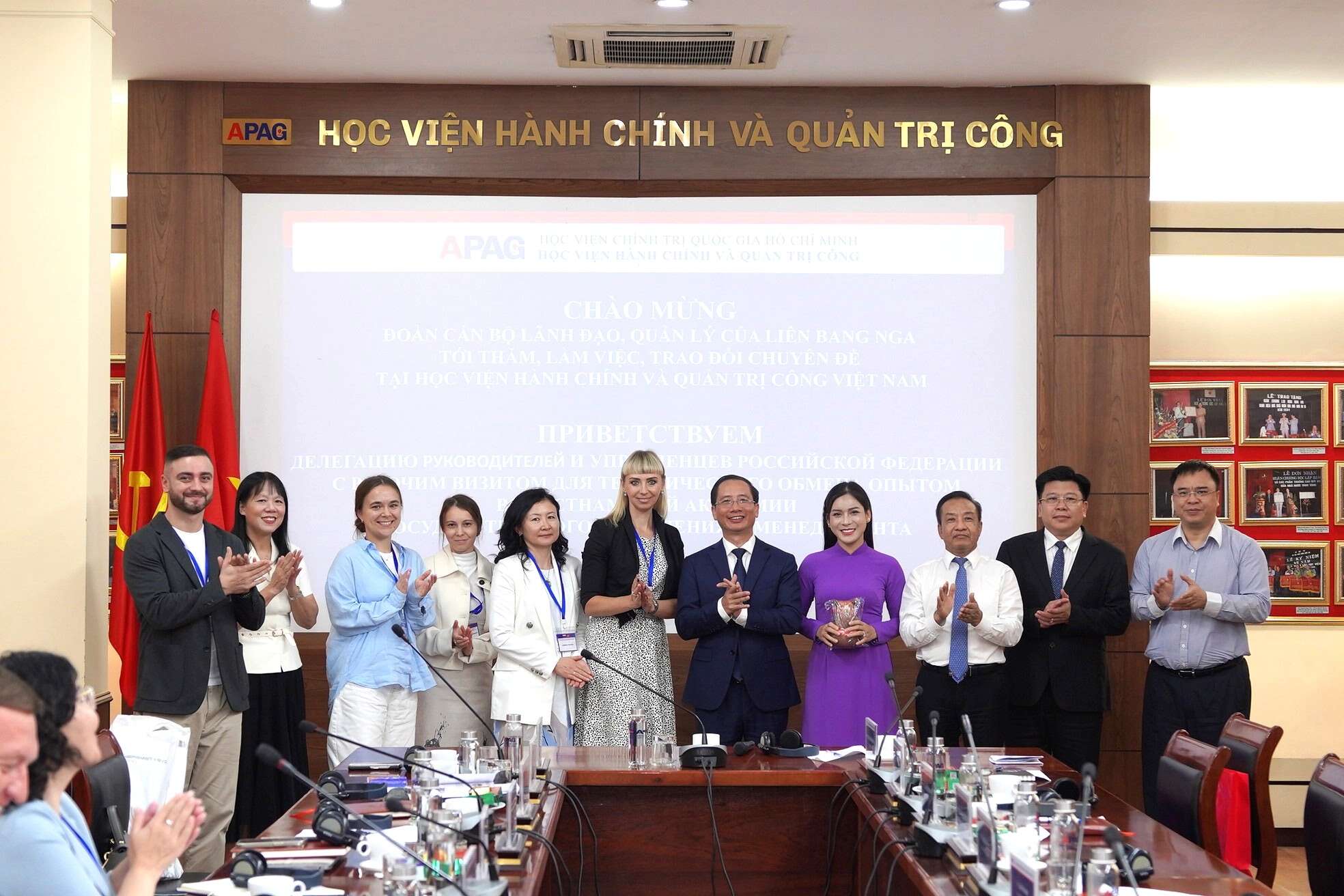 Ms. Shafinskaia Natalia, Head of the Department of International Cooperation and Development, RANEPA, presents souvenirs to APAG.
Ms. Shafinskaia Natalia, Head of the Department of International Cooperation and Development, RANEPA, presents souvenirs to APAG.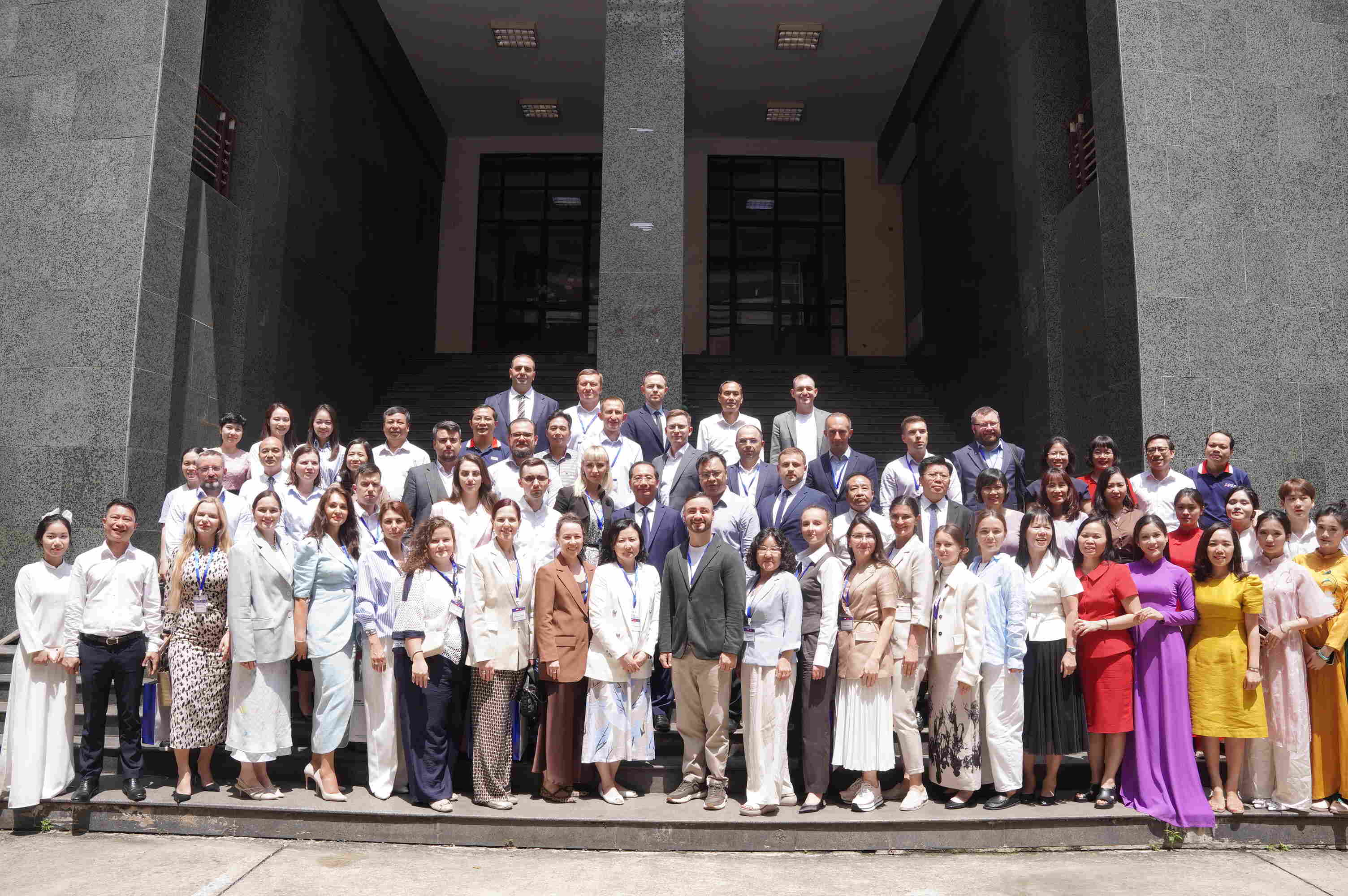 Meeting participants.
Meeting participants. 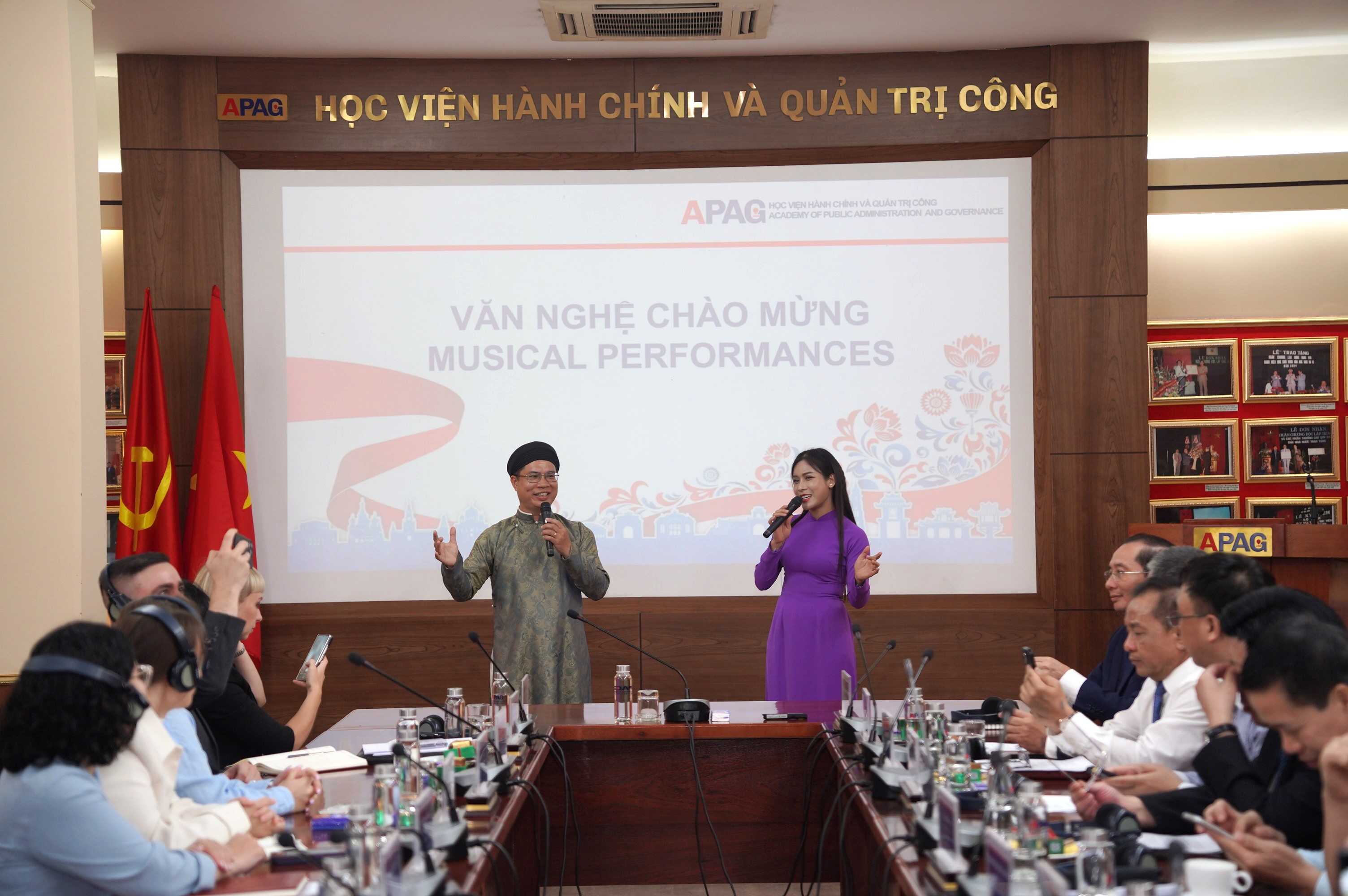 Musical performances.
Musical performances. 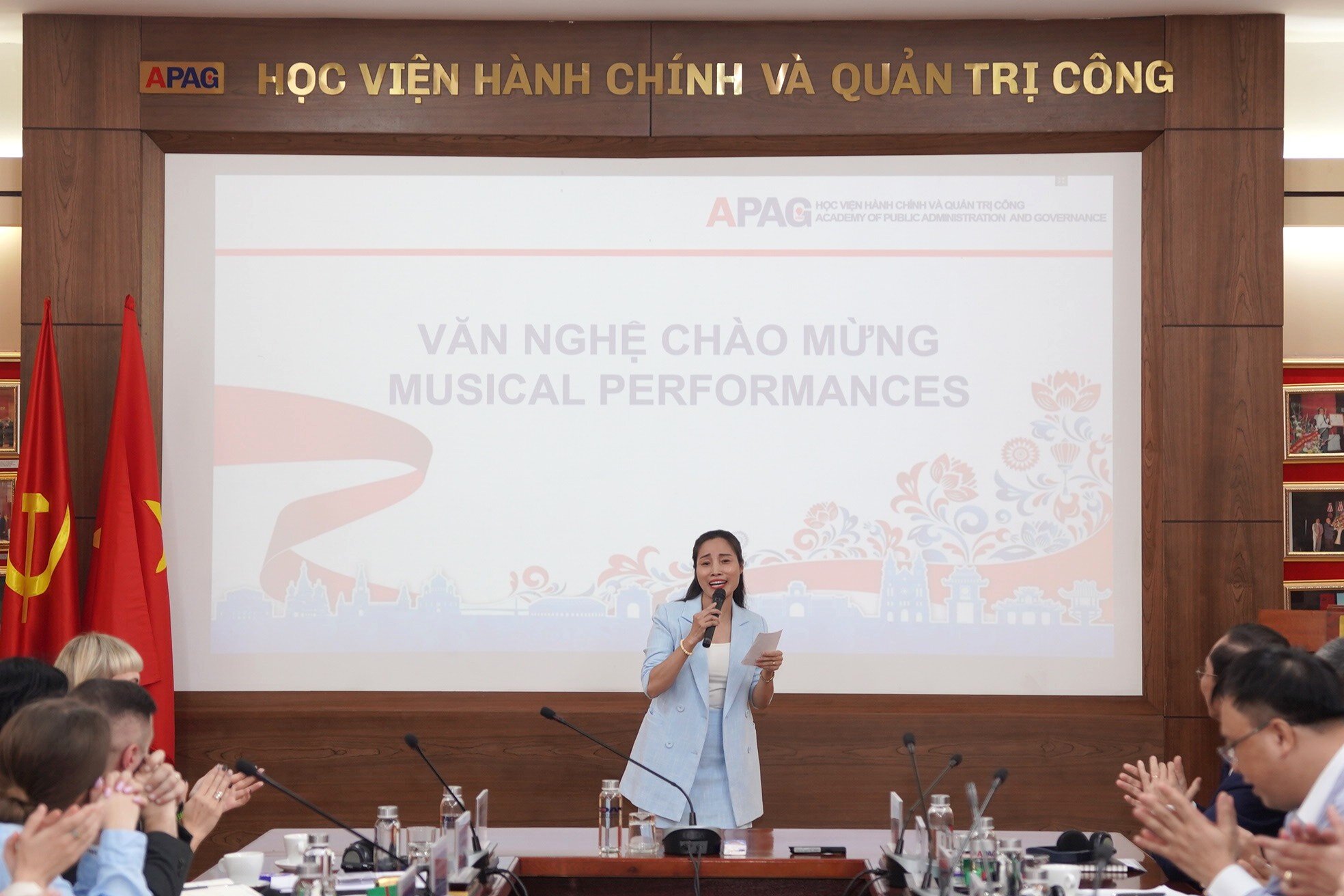 Musical performances.
Musical performances.